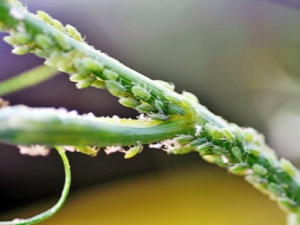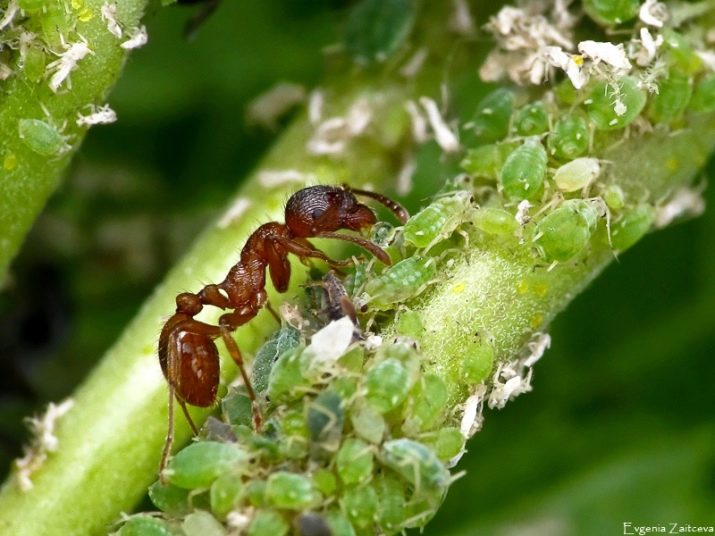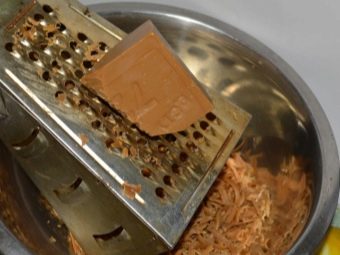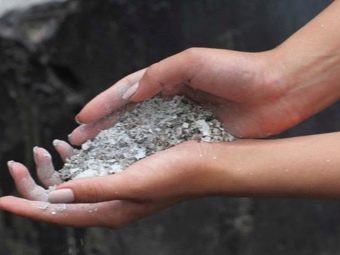How to get rid of aphids on dill?

Dill grows in the garden of every gardener, this fragrant greens are widely used in cooking.Despite the fact that dill plants protect the site from pests, attracting predatory aphid-eating insects. Sometimes the spicy greens themselves can be the target of aphids attack.
Pest appearance
Aphids parasitize throughout the summer season, it can be detected both in early spring and in autumn. It is conveniently located on the branches of dill and multiplying rapidly, captures more and more plants.
The reasons
Poor planting and garden maintenance can cause aphids. Weakened plants are easier to attack, their leaves turgor reduced. It is easier to bite through the sheet that has lost its elasticity.
To provoke the appearance of harmful insects can poor-quality cleaning of the site. Old rags are the source of the spread of aphids, because pest eggs are often on it.
The serious reason for the appearance of pests on dill is ants. They love to feast on the products of vital activity of aphids - a sweetish, sticky penny. Ants transfer aphids from one plant to another, spreading pests throughout the garden. And even if you follow your site perfectly, ants can bring aphids to your landings from other places. With the onset of cold weather, they hide the eggs of aphids in their anthills, and in the spring carry the larvae to young plants.
Determination of presence on the plant
Aphids on dill can be detected with the naked eye, it reaches a length of up to 5 mm. Swarming small green insects on the leaves are a sign that the pest has been attacking the plant for more than one day.
Aphids can live not only on the leaves of green, but also on the roots. Root aphid is not easy to recognize, because it is hidden from prying eyes.
If the planting is yellowing and lagging behind, you can be suspected of having a pest. If such signs appear, carefully examine the plant root for insects.
The abundance of ants in the beds with dill indicate that the greens attacked aphid. These black insects never leave their wards alone.
Sticky drop on the leaves of the plant, which is so to the taste of ants, is also a sign of the active activity of the pest.
Insect damage
Aphids cause serious damage to dill planting. Sucking the juice from the tender greens, it deprives the plant of moisture and all the nutrients. Dill withers and may die, leaving the gardener without a crop.
Sticky aphids on the leaves impede the natural breathing of an umbrella plant.
On the sticky honeydew develops soot fungus, which covers the leaves of dill with black bloom. The photosynthesis of such a plant becomes inferior.
The plant affected by aphids is subject to various diseases. Aphid actively carries dangerous plant viruses.
Dill can be subject to such diseases as:
- verticillary wilting;
- chalcosporosis;
- fomoz;
- powdery mildew.
If some viruses can be cured with the help of special means, others are incurable. With the development of dangerous diseases greens to be completely destroyed. Therefore, in order to avoid infection with the body, it is necessary to fight at the first signs of its appearance.
Preventive measures
Aphids are very active, and not a single section passes by. Prevents prevention from aphids.
When growing dill must follow simple rules.
- Dill should be planted in well-lit, ventilated areas. The soil should not be waterlogged.
- Provide moderate watering and fertilizing greens. The pest first attacks weakened plants.
- Feeding dill with a solution of potassium and superphosphate, diluted 1: 2, will improve the protective functions of the plant.
- Pungent odors are not to your liking, so onions and garlic can be planted next to the dill. Scare away aphids and spicy herbs: rosemary, mint and coriander.
- Periodically inspect plants, pay attention to the sinuses and the inner side of dill leaves. Remove manually found pests, not giving them the opportunity to breed.
- In the spring, to carry out a qualitative preparation of the site: remove garbage, old rags and remove weeds. After all, the overwintering larvae and eggs of the pest can be found on the plant remains.
- Conduct soil disinfection. To do this, one day before planting dill pour boiling water on the garden bed. When setting the hot weather, you can cover the beds with plastic wrap and leave for 3 days. These methods will destroy the eggs of aphids in the soil, which may remain there from last year.
- It is necessary to periodically fight with ants. You can do this with boiling water, watering them ant nests.
- Install bird feeders in the garden. Attracted in this way, sparrows and tits will protect your garden from aphids.
- Ladybugs and hoverflies are the main enemies of aphids. If you find these beneficial insects in your garden, you can gently transfer them to the fennel beds.
These recommendations will help protect spicy plants from aphids and grow healthy herbs to the table.
Options fight
If preventive measures did not help, and the aphid still attacked the beds, do not despair. At present, many methods of pest control have been developed, which will allow to save umbrella plants.
Folk remedies - the most acceptable option to combat aphids. After processing by such means, bunches of dill are suitable for food. Before eating them enough to rinse in warm water.
The composition of any folk remedy includes economic or tar soap. It glues the aphids, not giving her the opportunity to move. Immobilized aphid can not fully eat and dies.
For the destruction of aphids in 10 liters of water diluted 100-200 g of soap. It is better to take tar soap, the smell of tar depresses aphid. For convenience, the soap can be rubbed on a large grater and stirred in 1 liter of warm water, so it is better to dissolve. Then dilute the resulting solution in 9 liters of water. Means for aphids are ready, they need to spray the beds with greens from a spray bottle.
For greater efficiency, 10 tablespoons of soda can be added to the soap solution. Soda is absolutely safe for both plants and humans, but the aphid will suffer from it. For the same purpose, suitable vinegar 200 g per 10 liters of soapy water. One has only to comply with the correct dosage, high acidity can cause yellowing of the fennel branches.
Also in the soap solution you can add mustard, red pepper and cinnamon. However, such a tool can affect the taste of dill. Therefore, after using these spices, herbs should be soaked in water for 5 minutes before use and rinsed thoroughly.
Another good remedy is ash. To obtain a solution, it is necessary to insist during the day 3 kg of ash in 10 l of water, strain and add 100 g of any soap or laundry detergent. Ash, due to its potassium content, is beneficial for plants, and for aphids, it will not taste good.
Get rid of harmful insects will help all known carbonated drink - Coca-Cola.
The soda in its composition has a depressing effect on pests, and the stickiness of the drink immobilizes them. Seasoned gardeners are not limited to Coca-Cola, they believe that any kind of carbonated drink is suitable for fighting with aphids.
To destroy aphids on dill, you can use herbal infusion.
The following plants are suitable for its preparation:
- tansy;
- sagebrush;
- nettle;
- yarrow;
- celandine.
For the manufacture of effective means of any of the above plants, finely cut and pour boiling water. Tightly close the lid and insist for a day. Ready infusion filter, cool and produce them processing greens.
Aphid does not tolerate the sharp smell of garlic, so you can make this infusion. Mash the garlic cloves and add vegetable oil to the consistency of liquid gruel, leave it in a cool place for a day. Next, squeeze the infused mush, using a two-layer gauze. The output should be at least two teaspoons of garlic infusion.Pour the infusion with two glasses of water and add half a teaspoon of washing powder or liquid soap.
Afraid of infusion from citrus peel and onion. Orange or lemon rind finely cut, add onion peel, pour hot water and infuse for three days. The resulting solution is necessary to spray the dill twigs and pour its roots.
Most of the members of the Solanaceae family in the leaves and stem contain a poisonous substance for aphids - solanine. Therefore, the infusion against aphids can be prepared from the tops of these plants. So, the leaves of tomatoes or potatoes should be boiled with boiling water, infused for a day, and the poison for aphids is ready.
He doesn’t like tobacco; you can make from it not only an infusion, but also fumigate the dacha and give it a clean bed. For sprinkling, it is better to purchase tobacco dust in a specialized shop.
The same products cannot be used against aphids, the pest may develop resistance to active substances and the treatment will become ineffective. It is recommended to alternate the use of different means, as well as to combine traditional methods of combating biological products.
The following professional biological products are popular:
- "Arrow";
- "Biotlin";
- "Entobacterin";
- "Fitoverm".
The composition of biological products includes waste products of various bacteria. To perish aphids, the contents of the bag are diluted in water, adhering to the recommendations on the package, and the plants are processed. Eating greens in food after spraying can be no earlier than 6 days.
Dill is best treated in calm weather at a temperature not lower than +22 C. But it is even better to treat the greens, when the weather is hot, the active components of biological agents work better in the heat. When spraying, attention should be paid not only to the branches of dill, but also to the soil. After the rain, the treatment must be repeated.
It is necessary to abandon the use of chemicals in the fight against aphids in dill. Toxic substances remain on the plant for a long time, making it unfit for consumption.
Removal from cut greens
Remove aphid from the cut dill is simple. To do this, pour water into a deep bowl, dilute several tablespoons of salt in it and put green tufts there. Dill is left for 10–20 minutes, the plant louse should separate itself from the twigs. Before eating the greens are taken from saline and washed with cool water.
If after this aphid is still on the dill, the procedure can be done several times. Aphids do not lay eggs on plants, and the remaining single individuals can be removed by hand. The products of vital activity of the pest are not dangerous for a person, and you can eat the dill cleared from aphids.
You can learn more about how to get rid of aphids on dill, you can in this video.











































